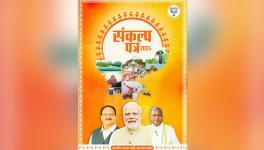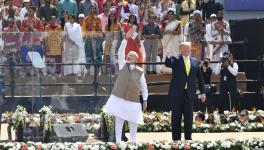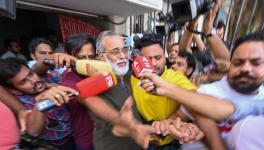Parliament Museum Upgrade Caught in Acrimonious war of Words
Parliament of India. Image Courtesy: Wikimedia Commons
The Rs 15-crore project to modernise and upgrade the Parliament Museum has been caught in an acrimonious exchange of words between the Lok Sabha Secretariat and the National Museum Institute (NMI), a deemed university under the Union ministry culture that was asked to “conceptualise, create and curate” content last April.
The Parliament Museum, inaugurated at Parliamentary Library Building on August 15, 2006, by then-President APJ Abdul Kalam, is expected to be reopened to the public on August 15, The Indian Express reported.
The upgraded museum will be spread over two floors and showcase the themes of ‘Seeds of Democracy’, ‘Constitutional History of India’, ‘The Structural Strength of India’, ‘Indian Democracy in Action’, ‘Successful Running of India’s Democracy’ and ‘The Parliament Building: Past, Present and Future’.
A senior official in the ministry of housing and urban affairs told the newspaper that the museum was not part of the Central Vista redevelopment masterplan.
When NMI was entrusted with the task, Gurugram-based private company Pan Intellecom was awarded a Rs 14-crore contract to implement the upgrade based on NMI content.
According to sources, Pan suggested to NMI, through historian and former AMU professor Makkhan Lal—who worked on the Prime Ministers’ Museum—on January 24 that for the theme ‘Seeds of Democracy’, the entrance should showcase speeches on the roots of democracy by first Jawaharlal Nehru, BR Ambedkar and Prime Minister Narendra Modi.
Lal recommended the following excerpts: “India is the mother of democracy” speech by Modi at the Red Fort on August 15 last year; part of Nehru’s speech in the Lok Sabha on March 28, 1957, about why India had chosen a parliamentary democracy; and an excerpt from Ambedkar’s speech at the Constituent Assembly on November 25, 1949, about India’s history of democracy.
In response, Manvi Seth, dean (academic affairs) and NMI’s department of museology head, also in charge of the project, wrote to Lok Sabha secretary general Utpal Kumar Singh on February 9 expressing displeasure at Lal’s recommendation.
“It is paramount that narrative and content be treated as sacrosanct and thoroughly objective. No modification (addition or deletion) regarding the content should be done by Pan without prior consultation with NMI and agreement on the same,” she wrote.
A senior official said that NMI saw Pan’s content suggestions as encroaching on its turf.
In an email sent to the Lok Sabha Secretariat on March 24 and copied to NMI, Lal flagged “the horrible quality of contents” provided by NMI and asked it to disclose those involved in the content preparation, The Indian Express reported.
On April 3, Lok Sabha Secretariat’s additional secretary Prasenjit Singh emailed NMI echoing these concerns and said, “NMI is evading the sharing of details of experts.” He also highlighted that “complete templates for the first three themes” are still awaited.
A week later, NMI shared links to articles from Wikipedia about Mysore, Aundh and Travancore and Cochin as sources of its references.
An angry Lal replied on April 12: “As a historian, I am very disturbed and feel ashamed that Parliament Museum is being curated based on Wikipedia and questionable sources from the net rather than published sources in the libraries. NMI should be asked to provide the list of the names of authors of the contents and references from them under their signature and deal. Else it must be disassociated with the project and asked to return the money taken so far for the purpose.”
Lal declined to comment to the newspaper.
Pan managing director Harbir Singh Panesar said, “We have been given time to complete the project within five months of receiving contents which we are yet to get. I can tell you the expected completion date only when we receive all inputs.”
Singh of the Lok Sabha Secretariat was unavailable for comment.
In response to Lal’s reply, Seth told the newspaper that it is “patently wrong that a large portion of source material for the content submitted by NMI was from Wikipedia”.
“Content has been created through research, fieldwork, consultation with pertinent subject matter experts and archival research … regular consultation and discussions have been held with the Parliament Museum,” she added.
Get the latest reports & analysis with people's perspective on Protests, movements & deep analytical videos, discussions of the current affairs in your Telegram app. Subscribe to NewsClick's Telegram channel & get Real-Time updates on stories, as they get published on our website.
























